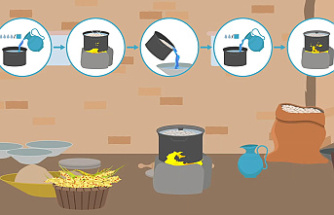It's been a good two and a half years since Angie Berbuer's life suddenly changed from one day to the next: in November 2019 she lost both her legs in a traffic accident. But the young woman didn't let that get her down. Quite the opposite: Today, the 23-year-old from Cologne is a successful influencer – she has more than 150,000 followers on Instagram, and significantly more than 450,000 people follow her updates on TikTok.
Berbuer also tells her story in an analogous way: she published her autobiography "My happiness is my decision" this year. In the stern interview, Angie Berbuer talks about her life without legs, phantom pain and the art of staying positive despite setbacks.
Angie, what exactly happened that November day?Angie Berbuer: I was traveling with a friend and we picked up his new car. A truck came very close to us on the autobahn because the driver didn't see us in the blind spot - and then the first accident happened. It all happened very quickly.
I went straight to the trunk and wanted to look for the warning triangle to secure the scene of the accident. I can hardly believe what happened next: an Italian ambulance drove up from behind - for some reason the driver wasn't paying attention and didn't see me - then there was a crash.
The car drove right into me, crushed me and my legs were severed right at the scene of the accident. Normally I would have been crushed and bled to death. Two factors that made me lucky in my misfortune: First, I wasn't in gear and didn't put the handbrake on. This pushed the car slightly forward. Second: Material to tie my legs was right at the scene of the accident, so I didn't bleed to death directly.
After that you found yourself in the hospital. What was your first reaction when the doctors told you you had no legs? The doctors told me I was missing both legs and I stopped for a moment and said, 'I can still feel them.' So I asked three questions: Can I still do sports? can i still have sex Can I still have children? All three were answered yes. That's when I knew: my life will be different, but my life will still be worth living. The goals I had were still achievable.
Can you describe what this phantom pain feels like? It's a bit like your legs are falling asleep. Or like sore muscles. You can think of it as if the blood vessels in my body are all the cables. The cables are now cut off where my legs end. It's like in the computer that you get a signal, but the signal doesn't come through, it comes back and the head gets the feedback that something is wrong.
How did your family and friends react to your accident? The environment actually made the accident even worse for me. The roles were totally reversed: it was nice that people were there, but I had to comfort people. I always had to prove to others that I was fine. I was physically screwed, but mentally I was fine. And nobody believed me. That was the worst for me.
It seems you made peace with the accident pretty quickly. Were there any low points? There were three situations that were bad for me. For one, my father said it would have been better for me if I had died in the accident.
Then there was a situation with my mom, who said when I was discharged from the hospital that I should put a blanket over my legs because people look at me like that. That was very hurtful.
And then the big question arose for me: Will someone be able to love me again? Because I'm not complete anymore. I haven't seen my worth anymore.
How do you feel about it today? I'm full, I'm a whole person, even if I'm missing both lower legs. I'm totally self-sufficient, I can still run a household. Sure, I get support every now and then. But I'm entitled to that too. And you don't have to be ashamed of accepting it or asking for it. After the hospital, I didn't see that value in me. Then I thought that I am now a person who has to submit.
Now you're on prostheses. How does this work? The prostheses are controlled by microprocessors with a small computer inside. I have to charge it once a week, which I regularly forget. If I charge them for half an hour, they last another three hours. My leg was put in plaster and my shaft was built from the mold, i.e. the upper part of the prosthesis. My thigh is then in a sleeve and the prostheses react to how I shift my weight.
How expensive are the parts? I already have an expensive sports vehicle on my legs... I think it's between 60,000 and 80,000 euros.
You gave your book the title: "My happiness is my decision". It may sound a bit simple, but that's exactly what many people struggle with, even with comparatively minor problems: That it's difficult for them to be happy regardless of circumstances. What's your secret behind it? "My happiness is my decision" stands first of all for me. I don't want to say that everyone can decide that for themselves, if only because of mental illness. And I, too, speak about problems and limitations.
But I try to always see the positive in situations where I really experience shit. I already said in the hospital: I am the woman who never loses her smile. Or if I ask myself the big question: why me? Then I think to myself: Because I was able to deal with it. I just try to find my happiness in everything - both positive and negative. Why should I quarrel with my misfortune? I just accept it.
Very soon after the accident, while still out of the hospital, you started posting updates from your life on social media. How did you end up going down this path? When I turned my cell phone back on in the hospital, so many messages came in that I couldn't even read them. From friends, family, acquaintances, from people who know my friends, just way too much.
Then I started posting on Instagram - more with the idea of informing people and not so much to motivate people. That came later. At the time of the accident I had around 800 followers - and that picked up speed relatively quickly, suddenly there were 4000 followers. And then at some point I talked more and more and shared my progress every day.
How did you deal with this sudden attention? That was really nice for me. I never got much attention from my parents, and when you get that, it's a great feeling.
The amount of feedback really means the world to me, but no matter how many followers I have, no matter how many messages I get, that can never replace the attention, love and care of parents. I've accepted it, but there's still this little kid inside of me that wants it.
What reactions do you get today to your missing legs? They are 99 percent positive. The best reactions come from children saying: look mom, that's a Transformers girl. Many people have to look twice first, because from the outside it looks totally consistent, it looks as if the two prostheses belong to me. And it doesn't just look like it - it really is.
Are there any uncomfortable situations? Once in a while. For example, when someone comes up to me and says: respect that you dare to come out. What am I supposed to do, wait in the basement for death? I've learned to deal with it, but these are reactions that I don't find beautiful.
What kind of interaction do you wish for? A more open approach, that's why I'm talking about it. I want people to go through life with awareness. The issue of accessibility is particularly important to me.
My apartment is completely barrier-free for me, but maybe not for someone who is visually impaired. Accessibility means something different for everyone: for example, how is someone who is paralyzed or has only one arm supposed to operate a soap dispenser where you have to press the top and hold your hand down? Or trash cans that you have to step on. How is someone in a wheelchair supposed to do that?
In your book you write: "I'm not happy despite my missing legs, but because of my missing legs." Does that mean your life is better today than it was before the accident? If I had lay there 30 seconds longer after the accident without anyone helping me, I would have bled to death. Once you've been that close to death, you perceive life very differently.
So I would say I'm happier now. My life wasn't worse before the accident, it was just different - but I've become a lot more grateful. Grateful for everything positive and negative that I am allowed to experience in life because it shaped me into the person I am today. And this gratitude makes me happy.












